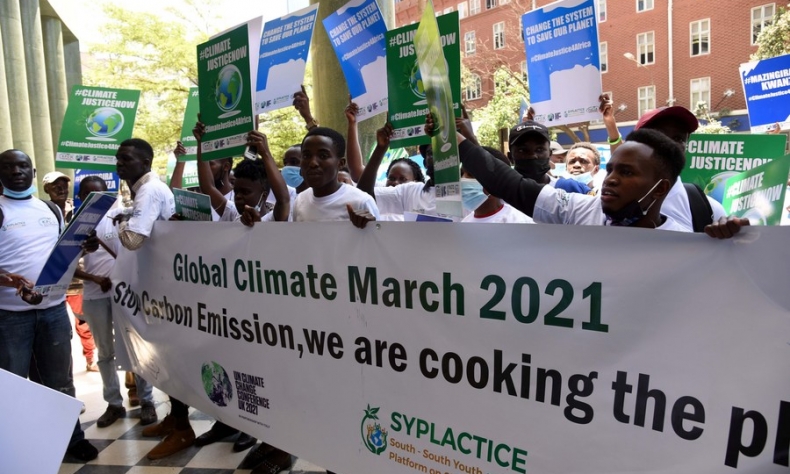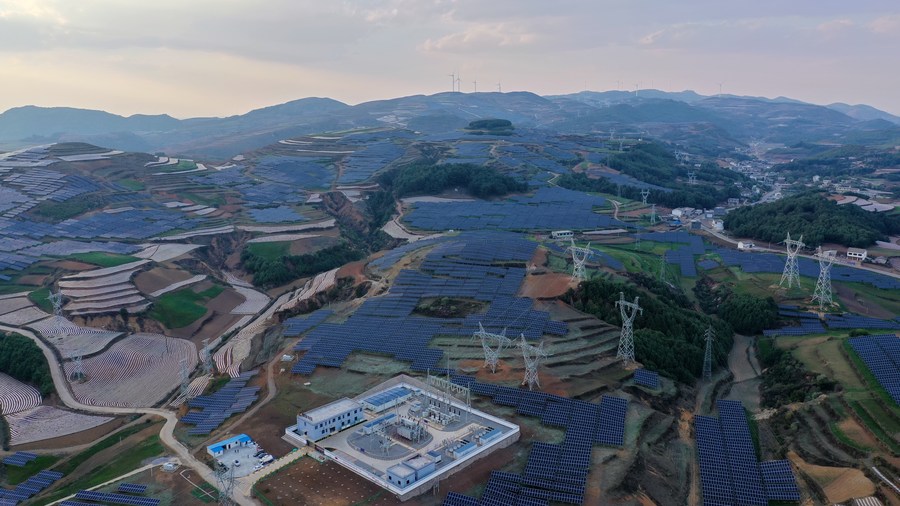From Paris 2015 to Glasgow 2021, the Clock Is Ticking

China is willing to team up with the international community to create a global climate governance system that is fair, rational, cooperative and beneficial to all.
With nearly 100 gardens and parklands, it is no wonder that Glasgow is known as the Dear Green Place, the perfect place to host the 26th UN Climate Change Conference of the Parties, or COP26. Delegates from some 200 countries are gathering in the British city to discuss ways to upgrade the global response to the world’s increasingly profound climate crisis. UN Secretary General António Guterres expressed particular concern over slowing collective action ahead of the meeting. “We need to make sure we reverse the trends, not maintain them. It is now clear we are coming to a point of no return,” he said.
Governments have already failed the first test of the Paris Agreement. The landmark document was reached on December 12, 2015 at the COP21, uniting 191 countries plus the EU in a global framework to avert dangerous climate change by preventing the global surface temperature from increasing by 2 degrees Celsius from pre-industrial levels in this century and pursuing efforts to limit this rise to 1.5 degrees Celsius. In accordance with the principle of “common but differentiated responsibility and respective capabilities,” nations then submitted their Nationally Determined Contributions (NDCs) to express their most serious commitment to reducing their emissions and addressing ensuing climate impacts.

Six years on, at the current level of global action, there will be a 16-percent increase in greenhouse gas emissions in 2030 compared to the 2010 levels; the global average temperature is set to increase until at least mid-century. The planet is projected to warm up 2.7 degrees Celsius above pre-industrial levels by the end of this century unless deep reductions in carbon dioxide and other greenhouse gas emissions occur in the coming decades, as per the Intergovernmental Panel on Climate Change’s Sixth Assessment Report released in August.
Without immediate and effective countermeasures, we won’t be able to avoid a climate catastrophe. Weather-related extreme events such as intense heat waves, devastating floods and disastrous wildfires will seriously impact countries around the world on an ever-intensifying basis, marking nothing less than “a code red for humanity.” If we miss this opportunity to adopt even stronger joint actions and more effective policies to protect our planet, we cannot hope to be given a second chance in the future.
A daunting task
COP26 President Alok Sharma said the Glasgow climate talks would be “tougher” than negotiations in Paris six years ago and it would become a hard feat to build consensus and deepen cooperation. However, despite having to take on some more challenging missions, the international community still looks forward to the success and positive outcomes of the conference.
First of all, it should uphold the gravity of the Paris Agreement. The document provides a basic and legal framework for a globally coordinated climate policy. A declaration winning extensive support is fundamental and in turn will reaffirm the importance of reducing greenhouse gas emissions dramatically by 2030 and achieving global net zero emissions around mid-century.
COP26 is also expected to strengthen international policy coordination and practical cooperation in specific areas like speeding up the phasing out of fossil fuels, reducing deforestation, and funding coastal habitat protection systems.

The conference should urge wealthy nations to deliver on their promise to channel $100 billion a year to underdeveloped nations to help them transition to greener energy and deal with the impacts of climate change. A UN report last year concluded that the continued funding target was out of reach. Today, there is an increasingly pressing need to establish a predictable and sustainable climate financing mechanism.
Last but not least, it should promote mutual understanding and help restore trust among nations. Climate change is among the greatest challenges facing humanity and requires global solutions involving all countries. The lingering COVID-19 pandemic has fueled the ongoing debate about the urgency of climate change actions, dramatically altering the favorable environment for advancing cooperation.
China’s commitment
China has always taken on a constructive role in enhancing international cooperation onclimate change. Chinese President Xi Jinping’s written statement entitled Unite for Action to Protect the Planet, Our Shared Home called on all parties to take stronger actions to jointly tackle the climate challenge.
Over the past decade, China has achieved, and even exceeded, its key climate and renewable energy goals as well as its NDCs under the Paris Agreement. After reaching its 2020 carbon emission target three years ahead of schedule, it will lower its carbon intensity by over 65 percent before 2030—from the 2005 level. China launched the world’s largest carbon trading market in July, covering over 2,200 coal- and gas-fired power plants plus related facilities, marking a milestone in the country’s efforts to transition to a clean-energy economy. Its renewable energy production and deployment is already the largest in the world, currently with a total installed capacity of more than 940 gw in wind, solar, and hydropower. China conducts extensive international climate cooperation by technically and financially supporting numerous climate and clean energy projects, including through joint projects with other developing countries.

By contrast, certain developed countries have just been paying lip service to the concept of international cooperation. On the face of it, some of them attend the COP26 for the sole purpose of indulging in a new round of finger-pointing, without any fundamental fair or impartial formula.
On the one hand, they don’t recognize the reality and repercussions of their own historical responsibilities and high per-capita emissions, shielding away from the principle of common but differentiated responsibility established by the UN Framework Convention on Climate Change. On the other hand, these nations are very reluctant to offer badly needed climate financing to developing, and the least developed, nations to reduce economic and environmental harm brought on by climate-related hazards. Their tendency toward unilateralism is unwelcome in Glasgow.
In the words of Xi, “When it comes to global challenges such as climate change, multilateralism is the right prescription. I hope all parties will take stronger actions to jointly tackle climate challenge and protect the planet, the shared home of us all.”
The world stands at a crossroads on stronger, more targeted climate actions. China is willing to team up with the international community to create a global climate governance system that is fair, rational, cooperative and beneficial to all.
The author is an associate research fellow with the China Institute of International Studies.
 Facebook
Facebook
 Twitter
Twitter
 Linkedin
Linkedin
 Google +
Google +










